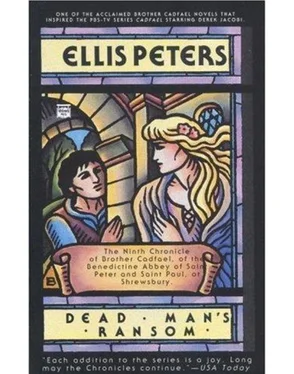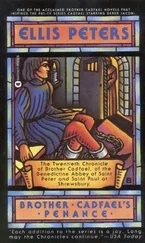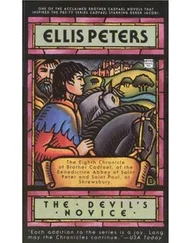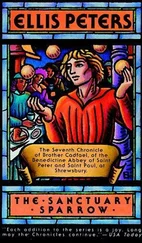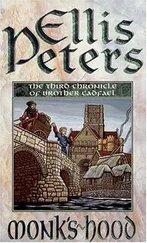“Not to the length of killing an old man in his bed,” said Hugh mercilessly.
“No! Nor nothing to match it,” said Cadfael with a deep sigh and briefer smile. “Pardon me, Hugh! I am Welsh and you are English. We Welsh recognise degrees. Theft, theft absolute, without excuse, is our most mortal offence, and therefore we hedge it about with degrees, things which are not theft absolute—taking openly by force, taking in ignorance, taking without leave, providing the offender owns to it, and taking to stay alive, where a beggar has starved three days—no man hangs in Wales for these. Even in dying, even in killing, we acknowledge degrees. We make a distinction between homicide and murder, and even the worst may sometimes be compounded for a lesser price than hanging.”
“So might I make distinctions,” said Hugh, brooding over the placid ford. “But this was my lord, into whose boots I step, for want of my king to give orders. He was no close friend of mine, but he was fair to me always, he had an ear to listen, if I was none too happy with some of his more austere judgments. He was an honourable man and did his duty by this shire of mine as he best knew, and his death fetters me.” Cadfael was silent and respectful. It was a discipline removed now from his, but once there had been such a tie, such a fealty, and he remembered it, and they were none so far apart.
“God forbid,” said Hugh, “that I should hurl out of the world any but such as are too vile to be let live in it. And this is no such monster. One mortal error, one single vileness, and a creature barely—what’s his age? Twenty-one? And driven hard, but which of us is not? He shall have his trial and I shall do what I must,” said Hugh hardly. “But I would to God it was taken out of my hands!”
BEFORE HE LEFT THAT EVENING HE MADE HIS WILL CLEAR for the others. “Owain may be pressed, if Chester moves again, he wants his men. I have sent to say that all who are clear now shall leave here the day after tomorrow. I have six good men-at-arms belonging to him in Shrewsbury. They are free, and I shall equip them for their journey home. The day after tomorrow as early as may be, around dawn, they will be here to take Elis ap Cynan with them, back to Tregeiriog.”
“Impossible,” said Cadfael flatly. “He cannot yet ride. He has a twisted knee and a cracked rib, besides the arm wound, though that progresses well. He will not ride in comfort for three or four weeks. He will not ride hard or into combat for longer.”
“He need not,” said Hugh shortly. “You forget we have horses borrowed from Tudur ap Rhys, rested and ready for work now, and Elis can as well ride in a litter as could Gilbert in far worse condition. I want all the men of Gwynedd safely out of here before I move against Powys, as I mean to. Let’s have one trouble finished and put by before we face another.” So that was settled and no appeal. Cadfael had expected the order to be received with consternation by Elis, both on Eliud’s account and his own, but after a brief outcry of dismay, suddenly checked, there was a longer pause for thought, while Elis put the matter of his own departure aside, not without a hard, considering look, and turned only to confirm that there was no chance of Eliud escaping trial for murder and very little of any sentence but death being passed upon him. It was a hard thing to accept, but in the end it seemed Elis had no choice but to accept it. A strange, embattled calm had taken possession of the lovers, they had a way of looking at each other as though they shared thoughts that needed no words to be communicated, but were exchanged in a silent code no one else could read. Unless, perhaps, Sister Magdalen understood the language. She herself went about in thoughtful silence and with a shrewd eye upon them both.
“So I am to be fetched away early, the day after tomorrow,” said Elis. He cast one brief glance at Melicent and she at him. “Well, I can and will send in proper form from Gwynedd, it’s as well the thing should be done openly and honestly when I pay my suit to Melicent. And there will be things to set right at Tregeiriog before I shall be free.” He did not speak of Cristina, but the thought of her was there, desolate and oppressive in the room with them. To win her battle, only to see the victory turn to ash and drift through her fingers. “I’m a sound sleeper,” said Elis with a sombre smile, “they may have to roll me in my blankets and carry me out snoring, if they come too early.” And he ended with abrupt gravity: “Will you ask Hugh Beringar if I may have my bed moved into the cell with Eliud these last two nights? It is not a great thing to ask of him.”
“I will,” said Cadfael, after a brief pause to get the drift of that, for it made sense more ways than one. And he went at once to proffer the request. Hugh was already preparing to mount and ride back to the town, and Sister Magdalen was in the yard to see him go. No doubt she had been deploying for him, in her own way, all the arguments for mercy which Cadfael had already used, and perhaps others of which he had not thought. Doubtful if there would be any harvest even from her well-planted seed, but if you never sow you will certainly never reap.
“Let them be together by all means,” said Hugh, shrugging morosely, “if it can give them any comfort. As soon as the other one is fit to be moved I’ll take him off your hands, but until then let him rest. Who knows, that Welsh arrow may yet do the solving for us, if God’s kind to him.” Sister Magdalen stood looking after him until the last of the escort had vanished up the forested ride.
“At least,” she said then, “it gives him no pleasure. A pity to proceed where nobody’s the gainer and every man suffers.”
“A great pity! He said himself,” reported Cadfael, equally thoughtfully, “he wished to God it could be taken out of his hands.” And he looked along his shoulder at Sister Magdalen, and found her looking just as guilelessly at him. He suffered a small, astonished illusion that they were even beginning to resemble each other, and to exchange glances in silence as eloquently as did Elis and Melicent.
“Did he so?” said Sister Magdalen in innocent sympathy. “That might be worth praying for. I’ll have a word said in chapel at every office tomorrow. If you ask for nothing, you deserve nothing.” They went in together, and so strong was this sense of an agreed understanding between them, though one that had better not be acknowledged in words, that he went so far as to ask her advice on a point which was troubling him. In the turmoil of the fighting and the stress of tending the wounded he had had no chance to deliver the message with which Cristina had entrusted him, and after Eliud’s confession he was divided in mind as to whether it would be a kindness to do so now, or the most cruel blow he could strike.
“This girl of his in Tregeiriog—the one for whom he was driving himself mad—she charged me with a message to him and I promised her he should be told. But now, with this hanging over him… Is it well to give him everything to live for, when there may be no life for him? Should we make the world, if he’s to leave it, a thousand times more desirable? What sort of kindness would that be?” He told her, word for word, what the message was. She pondered, but not long.
“Small choice if you promised the girl. And truth should never be feared as harm. But besides, from all I see, he is willing himself to die, though his body is determined on life, and without every spur he may win the fight over his body, turn his face to the wall, and slip away. As well, perhaps, if the only other way is the gallows. But if—I say if!—the times relent and let him live, then pity not to give him every armour and every weapon to survive to hear the good news.” She turned her head and looked at him again with the deep, calculating glance he had observed before, and then she smiled. “It is worth a wager,” she said.
Читать дальше
